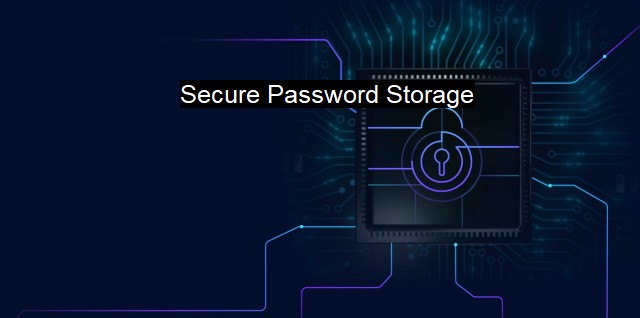What is Secure Password Storage?
Securing Your Passwords: Importance of Safe Storage in the Age of Cyber Threats and Data Breaches
"Secure Password Storage" is a foundational yet vitally important aspect that facilitates the protection of a user's sensitive data digitally. secure password storage refers to methods and strategies implemented to safeguard passwords from unauthorized access and potential cyber-threats. The significance of password security cannot be undermined, considering the alarming rate of data breaches and cybersecurity threats in today's digital-dependent world.Passwords are widely employed as an authorization tool granting access to digital systems and sensitive data. In this context, creating robust, random, and unguessable passcodes is only half the job. The other half involves securely storing them to ensure that hackers or unauthorized individuals cannot gain illegitimate access to private and vital data. Without secure password storage, a complex password would essentially be useless if cybercriminals effortlessly gained access to it.
Secure Password Storage practices involve not just the obvious prevention of plain text passwords but using hashed or encrypted passwords. Fundamentally, a hashing algorithm is a one-way function that transforms variable input into a fixed-length string of characters. When a user attempts to login, the hashing function operates on the inbound password, generating a string that is compared with the stored hash string. With correctly implemented secure password storage, only the hashed version of the password will be gleaned if there's a data breach, making it challenging and resource-intensive to determine the original password.
Further strategies for secure password storage involve the use of "salting" in synchronization with hashes. A salt is essentially a random and unique value for each user's password, which is then concatenated and put through the hashing function. This makes it significantly more protective against rainbow or precomputed hash attacks, where cybercriminals may use an existing list of precomputed hashes to match and find passwords.
As the digital world continues to evolve, cryptographic techniques have evolved as well. Advanced encryption methods, like the Argon2, bcrypt, scrypt, or PBKDF2, are recommended to provide extra layers of security against brute force attacks and further assisting in secure password storage. These methods enhance password security by using key stretching, which adds computational intensity to the encryption, slowing down the verification process and making the brute force attacks more time-consuming and thus less feasible.
As a step beyond individual practices, keeping your accounts' passwords secure involves securing your machines and systems against harmful software or viruses. This is where antivirus applications play a crucial role; they prevent, detect, and remove malware. Antivirus software often encrypts the stored passwords, and their regular updates help to ward off the ever-evolving threats. When paralleled with hardware security, this arrangement provides an added security perimeter against unauthorized breaches.
Secure Password Storage is critical in establishing a resilient fortification against cyberattacks, data breaches, and identity theft. Implementing it effectively demands comprehensive knowledge, plausible strategies, and a selection of tools catering to individual and organizational security needs. Beyond creating strong passwords, it is equally important to protect them from unauthorized access through stringent secure storage methods. Simultaneously keeping systems secure against any cyber threats and software maliciousness balances and enhances the overall protection. With today's persistent and mounting cyber threats, maintaining Secure Password Storage should be an authoritative and continuing goal for individuals and organizations alike.

Secure Password Storage FAQs
What is secure password storage?
Secure password storage refers to the process of storing passwords in a way that makes them difficult or impossible for hackers to access. This involves using encryption and other security measures to protect passwords from being compromised.Why is secure password storage important?
Secure password storage is important because passwords are a primary target for cybercriminals. If a hacker gains access to passwords, they can use them to gain access to sensitive information and accounts, which can lead to identity theft, financial loss, and other serious consequences.What are some best practices for secure password storage?
Some best practices for secure password storage include using strong, unique passwords for each account, using two-factor authentication whenever possible, storing passwords in a secure, encrypted password manager, and regularly changing passwords. It's also important to be mindful of phishing scams and other tactics that hackers use to try to steal passwords.What are some common mistakes to avoid when it comes to secure password storage?
Some common mistakes to avoid when it comes to secure password storage include using weak, easily guessable passwords, reusing passwords across multiple accounts, storing passwords in plain text, and sharing passwords with others. It's also important to be cautious of public Wi-Fi networks and other unsecured connections, as hackers can use these to intercept and steal passwords.| | A | | | B | | | C | | | D | | | E | | | F | | | G | | | H | | | I | | | J | | | K | | | L | | | M | |
| | N | | | O | | | P | | | Q | | | R | | | S | | | T | | | U | | | V | | | W | | | X | | | Y | | | Z | |
| | 1 | | | 2 | | | 3 | | | 4 | | | 7 | | | 8 | | |||||||